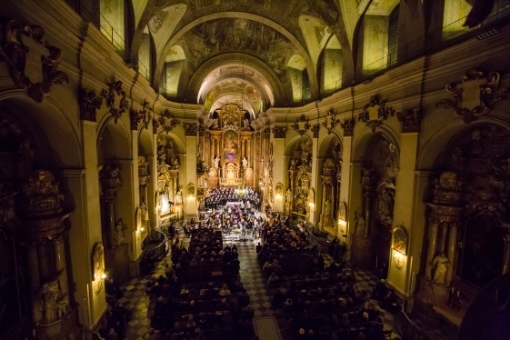Terroir, a term used especially in the wine industry, is the subheading of this year's 31st annual Easter Festival of Sacred Music. It refers to the set of natural conditions, especially soil properties, which give a crop its distinctive character. Terroir perfectly describes the dramaturgy of this year's edition, which is focused exclusively on the work of domestic composers in the Year of Czech Music.
“We will hear at least nine world premières. Unique this year, for example, are the Tenebrae, where six composers were divided into pairs and composed responsories and lamentations specifically for the given place and time," said dramaturge Vladimír Maňas. He stressed that the festival will not only feature contemporary works, but also works by older composers.
One of these is the oratorio Il serpente del bronzo, which will open the festival on Sunday 24 March. Jan Dismas Zelenka composed it on the theme of a biblical story and created a musical masterpiece of the High Baroque, which in its time was comparable to the best Baroque operas. “Ensemble Inégal will perform its Brno première," said Marie Kučerová, director of the Brno Philharmonic.
The second evening will be dedicated to Petr Eben. The Schola Gregoriana Pragensis together with one of the most important Czech organists, Tomáš Thon, will perform compositions that Eben composed directly for them. The programme is based on Mutations for Organ, Missa Adventus et Quadragesimae and a selection from the Suita Liturgica cycle, supplemented with Holy Week choral hymns.
This year, the festival commissioned music for the Tenebrae, candlelit concerts in darkened churches that traditionally take place from Holy Wednesday to Good Friday. It has brought together six composers: Lukáš Hurník and Zdeněk Klauda, Tomáš Krejčí and Jaroslav Pelikán, Ondřej Múčka and Jiří Miroslav Procházka. Each pair set nine responsories, the three Lamentations of the prophet Jeremiah, and Miserere to music for one evening. “They will be performed each time by a pair of vocal soloists who have joined together especially for this occasion, while the organ part will always be taken by one of the composers," said Ondřej Múčka, the festival's co-dramaturge. The artists will have a training retreat in Rome, including a public rehearsal in the chapel of the Pontifical College Nepomuceum.
The second half of the festival, during Holy Week, will open on Tuesday 2 April with an organ recital, which is part of each year's festival. This year it has been entrusted to Marek Pála, who will perform on the large Rieger-Kloss op. 3288 organ in the basilica on Mendlovo náměstí. In line with the festival's subheading, it will present a purely Czech-Moravian programme from High and Late Romanticism periods, including works by Josef Bohuslav Foerster, Leoš Janáček, Bedřich Antonín Wiedermann and others. “While the composers themselves are not unknown to us, the situation with their compositions is much more interesting. At the very least, it will be a Brno première," said Múčka.
Thursday belongs to the Kantiléna choir with the Brno Contemporary Orchestra and three compositions, two of which will be having their world premières. However, they are not contemporary works, as both were created approximately 30 years ago and have been waiting to be performed until now. The first is Pavel Zemek Novák's Songs for Easter Saturday , while the second is Peter Graham's Hallelujah. They will be complemented by Te Deum laudamus by František Gregor Emmert, who wrote this piece, one of his best, directly for the Kantiléna. The Songs for Easter Saturday are built around a very quiet dynamic in which the singers recite the verses, with the voices textually merging for a sharp intensification into the final forte only at the very end. Graham's two-movement Hallelujah is largely in a solemn and lucid vein, yet this purity is disturbed by sudden modulations, occasional dissonances and polyrhythms.
The penultimate concert of the festival will bring another piece commissioned specially by the festival, this time Sunday Morning by Martin Smolka. Its individual parts will emerge during the course of the concert, forming an outline similar to a mass with different types of hymns. Smolka's work is complemented by a varied mosaic of liturgical compositions from the 13th century onwards. All this is performed by the Cappella Mariana ensemble, a group which has been a guest of the festival many times before.
Janáček's Glagolitic Mass conducted by Tomáš Netopil will bring the festival to a close on Sunday 7 April “Although it is heard repeatedly, each time in the vicinity of other more recent works, each combination represents a new dialogue. This time, people will hear it together with the Brno première of Slavomir Hořínka's Rejoice III, which proves that strong, comprehensible and yet not pandering spiritual compositions can be created even today," said Maňas.
The six concerts and three Tenebrae will be held in four churches, in the basilica on Mendlovo náměstí and in the cathedral on Petrov Hill.













No comment added yet..